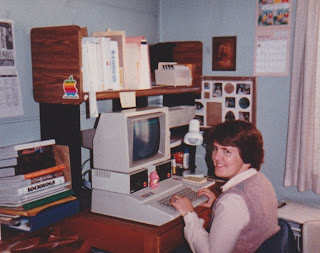My parents didn’t buy me a computer because they knew how much it would revolutionize the world, they bought it because I wouldn’t survive college without the miracle of spell check. The sales representative told us that eventually people would be able to carry computers as if they were large notebooks, but we didn’t believe him. At the time this picture was taken I couldn’t imagine carrying a full color computer in my pocket! I didn’t think I would one day be able to connect with people all over the globe and find information about anything in an instant. I could have any color on the monitor I wanted, as long as it was green or amber.
Although I didn’t add a modem until later, using a computer opened my world. Until I had a computer, writing was a miserable chore. The ability to write quickly and edit easily allowed me to express myself more freely. Newer technologies are not only giving unprecedented access to information, they empower people to create, communicate and share in multiple formats. The challenge is to show students how to be critical thinkers and collaborators who use technology as a creative tool, and not passive consumers who use it for entertainment.
Curtis J. Bonk writes that learners have the right to “share content that you create as well as comment on or evaluate the educational resources you find.” New technologies give more people the opportunity to share with a wider audience, but they also allow learners to share in a style that fits their unique strengths. Because of technological innovators, 1984 wasn't 1984!
Curtis J. Bonk writes that learners have the right to “share content that you create as well as comment on or evaluate the educational resources you find.” New technologies give more people the opportunity to share with a wider audience, but they also allow learners to share in a style that fits their unique strengths. Because of technological innovators, 1984 wasn't 1984!

Heidi! I picked your blog randomly from the list on the Discussion Board, but I got lucky! Your blog is very engaging visually, and this post provides a great context for the ideas we are being invited to consider via The Power Tools class and the Bonk readings. I love the visuals you included and appreciate the personal connections. I can relate to your comments about how computers have helped you academically. While spelling is not an issue for me, organization is. While I had been writing poetry since the age of 12, I never took my writing beyond a hobby because I would make such a mess of the page that revision (crucial to good writing) was next to impossible. I couldn't read my writing or follow my scribbles. I got my first computer at age 30 and it changed my writing life. I was able to revise! I got published! Anyway, I digress. Your post was very thought-provoking. Glad we are not living in 1984, but I think we will find that along with the freedoms that technology grants, there can also be loss of freedom -- privacy, quality time off-screen etc. As educators, we have the responsibility to help kids (and ourselves) use technology for growth, and know when and how to use it and when it is not appropriate or necessary.
ReplyDeleteCarmen, I agree that technology can be used to limit freedom as well as enhance it. Too often, I see students using computers as a video game. There is also a digital divide between the students who have unlimited access to technology at home, and those who have very little exposure to technology. In our family, time devoted to technology takes away from developing the focus needed to build relationships or practice an art.
ReplyDeleteHeidi,
ReplyDeleteI love the photo you included and your personal story. I think you should show this to students if you haven't already. It shows where we were technologically, so students can see how the past influences the future (or their present). I think Carmen brings up a good point about the loss of freedom and the different perspectives on privacy. I have noticed that today's students like to share almost EVERYTHING about themselves online. Like Carmen said, we have the responsibility to the students to show them how to use technology appropriately in and out of the classroom.
-Sharon
Wow, I haven't seen one of those in a long time! The challenge is certainly to show students how to be critical thinkers and collaborators who use technology as a creative tool, and not passive consumers who use it for entertainment. I believe that if teachers used technology and integrated it into their lessons on a regular basis, children would not simply use it for entertainment purposes. Integrating technology will require teachers to be critical thinkers and collaborate with other teachers to find the web tools students need to be successful.
ReplyDeleteGreat post!
Larissa Bryant